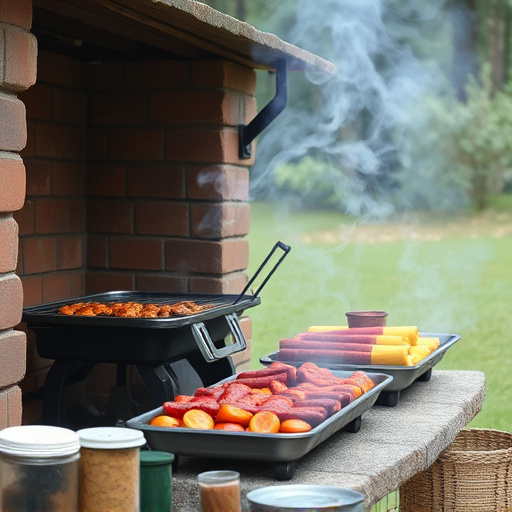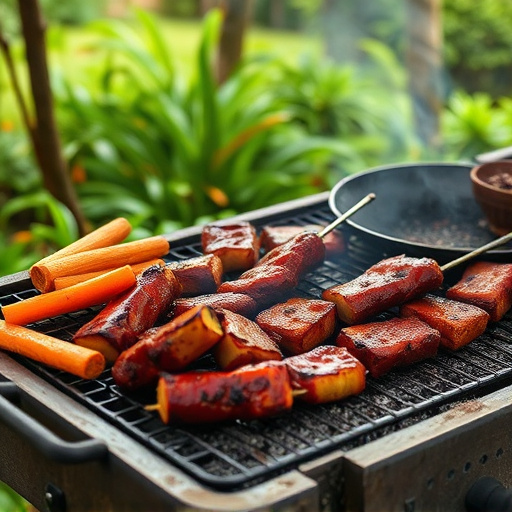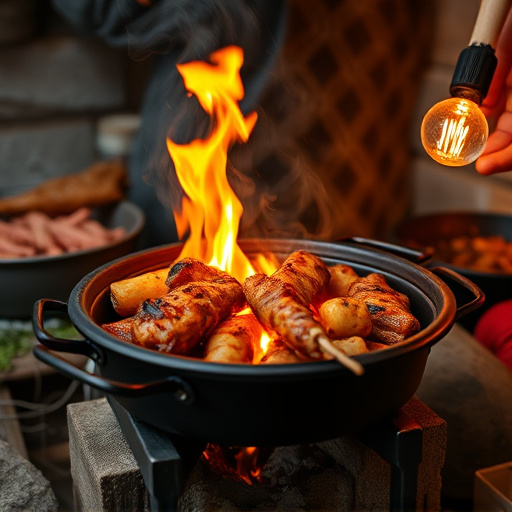TL;DR:
Marination is key to transforming simple grilled chicken into mouthwatering BBQ masterpieces. Soak meat in a mixture of acidic components (lemon juice, vinegar), spices (garlic, paprika, cumin), and herbs for 30 minutes to 24 hours. This process tenderizes the meat, adds flavor, and ensures juiciness. The right cut of bone-in, skin-on chicken with a balanced meat-to-bone ratio is ideal. Acids like lemon juice or vinegar break down proteins, preventing dryness. Marinades should be balanced for optimal results; let them sit longer for tougher cuts. Grilling methods vary: direct heat for thicker cuts and indirect heat for thinner ones to preserve juiciness. Customize your marinade with olive oil base, honey, chili powder, herbs, or spirits for unique flavors.
Discover the secret to mouthwatering, juicy grilled BBQ chicken with this easy marinade guide. We’ll explore the science behind marination to enhance flavor, helping you choose the perfect cut of chicken and craft a balanced blend of aromatic spices. Learn about the crucial role of acid in marinades and effective techniques for maximum absorption. From grilling methods to locking in juiciness to custom variations, elevate your BBQ game with this ultimate grilled BBQ chicken recipe.
- Understanding the Science Behind Marination for Optimal Taste
- Selecting the Right Cut of Chicken for BBQ
- Choosing a Balanced Blend of Aromatics and Spices
- The Role of Acid in Marinade: Acidity Levels Explained
- Techniques for Effective Marinading: Tips and Tricks
- Grilling Methods to Lock in Juiciness and Flavor
- Variations and Customization: Making it Your Own
Understanding the Science Behind Marination for Optimal Taste

Marination is an essential step in preparing grilled BBQ chicken recipes, and understanding the science behind it can elevate your culinary skills to a new level. The process involves soaking meat in a mixture of various ingredients, which not only adds flavor but also improves its texture. Acidic components like lemon juice or vinegar play a crucial role by breaking down proteins in the meat, making it tenderer and allowing other flavors to penetrate deeper. This action is similar to how marinades tenderize tough cuts when left to soak for an extended period.
Additionally, spices and herbs act as flavor enhancers, providing aromatic profiles that transform simple grilled chicken into a mouthwatering BBQ delight. The key is to allow sufficient time for the marinade to work its magic—the longer the meat soaks, the more flavorful it becomes. This scientific approach ensures your grilled BBQ chicken recipe turns out juicy, tender, and packed with complex tastes every time.
Selecting the Right Cut of Chicken for BBQ

When it comes to grilling perfect BBQ chicken, choosing the right cut is key. Opt for bone-in, skin-on chicken breasts or thighs for a juicy, flavorful result. These cuts have more fat and meat, which stays tender on the grill, ensuring your BBQ chicken recipe turns out moist and succulent. The skin, when rendered crispy from the heat, adds an irresistible crunch and seals in the juices, making it ideal for grilled dishes.
For best results, look for a good balance of meat to bone, allowing even cooking and preventing overcooking. This simple trick ensures your BBQ chicken is not only mouthwatering but also visually appealing, as the bones provide a natural handle for easy serving. Remember, selecting the right cut can elevate your grilled BBQ chicken recipe to a whole new level!
Choosing a Balanced Blend of Aromatics and Spices

When crafting a marinade for grilled BBQ chicken recipes, striking the right balance between aromatics and spices is key to unlocking juicy, flavorful meat. A well-curated blend should include a mix of sweet, savory, and spicy notes to tantalize the taste buds. Consider incorporating ingredients like garlic, onion, paprika, cumin, and chili powder for a robust flavor profile that enhances the overall BBQ experience.
Each spice contributes uniquely: garlic and onion provide a pungent, slightly sharp edge, while paprika adds a smoky, sweet warmth. Cumin offers earthy notes, and chili powder brings a gentle heat. This combination of aromatics and spices not only marinates the chicken but also serves as a delicious foundation for any BBQ sauce you choose to pair it with.
The Role of Acid in Marinade: Acidity Levels Explained

The Role of Acid in Marinade: Acidity Levels Explained
In any grilled BBQ chicken recipe, acidity plays a crucial role in tenderizing meat and enhancing flavors. Acids found in marinades break down proteins, allowing the chicken to become incredibly juicy and tender when grilled. Common acids used include lemon juice, lime juice, vinegar (like apple cider or white wine), and yogurt.
Acidity levels are determined by the concentration of these ingredients. A higher acid content will result in faster protein breakdown, but too much can be detrimental. Balancing acidity with other flavorings is key to creating a perfect marinade for juicy grilled BBQ chicken. This delicate equilibrium ensures that the chicken absorbs flavors without becoming overly sour or losing its natural moisture during the grilling process.
Techniques for Effective Marinading: Tips and Tricks

Marinades are a secret weapon for anyone looking to achieve juicy, flavorful grilled BBQ chicken. The key to effective marinading lies in combining acid (like lemon juice or vinegar) and oil, creating a mixture that penetrates the meat’s fibers, breaking down proteins and allowing flavors to infuse deeply. For best results with your grilled BBQ chicken recipe, let the marinade sit for at least 30 minutes, but ideally 2-4 hours, or even overnight in the fridge. This allows time for the magic to happen.
When it comes to tips and tricks, don’t be afraid to experiment with seasonings. A simple mix of salt, pepper, garlic powder, and paprika goes a long way, but feel free to add kick with chili powder or heat up your grill with spicy brown sugar. Another trick is to use a sealed container for marinating, especially when working with larger cuts of chicken. This helps prevent the marinade from drying out and ensures even distribution of flavors. Lastly, remember that thicker marinades can be more challenging to penetrate, so for tougher cuts, consider a longer soaking time or using a fork to gently break down the meat before grilling your BBQ chicken.
Grilling Methods to Lock in Juiciness and Flavor

When grilling BBQ chicken recipes, understanding how different methods impact juiciness and flavor is key to achieving mouthwatering results. Direct heat grilling, a classic technique, sears the exterior quickly, locking in juices internally. This method works well for thicker cuts like drumsticks or bone-in breasts. Conversely, indirect heat allows for slower cooking, ideal for thinner pieces as it prevents overcooking and drying out. This is perfect for achieving tender, juicy wings or breast meat with a tantalizing crust.
For maximum juiciness, consider marinating your chicken beforehand. Acids like lemon juice or yogurt can help break down proteins, while oils create a barrier to prevent moisture loss during grilling. Our easy marinade combines these elements, ensuring your grilled BBQ chicken recipe turns out perfectly juicy and flavorful every time.
Variations and Customization: Making it Your Own

When it comes to marinades, variations are endless and customization is key to making your grilled BBQ chicken recipe truly your own. The base of this marinade focuses on a simple blend of olive oil, lemon juice, garlic, salt, and pepper—a combination that complements any chicken cut and lets the natural flavors shine through.
Feel free to experiment with additions like honey for sweetness, paprika or chili powder for heat, fresh herbs such as thyme, rosemary, or oregano for an aromatic twist, or even a splash of your favorite spirit like bourbon or tequila for an extra punch of flavor. The beauty of marinating is the ability to tailor it to your taste preferences and culinary style.
